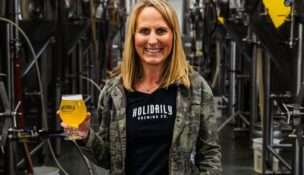How Locavore Delivery is supporting local farmers, one delivery at a time
The pasture-raised meat delivery company has seen an increase in sales, partners and employees since the rise of COVID-19
Ali Longwell //April 20, 2020//


How Locavore Delivery is supporting local farmers, one delivery at a time
The pasture-raised meat delivery company has seen an increase in sales, partners and employees since the rise of COVID-19
Ali Longwell //April 20, 2020//

Craig Taber. Courtesy of Locavore.
In the wake of coronavirus, companies across the country are pivoting their business models to survive the changing tides and to support the community in whatever way they can. While the Golden-based Locavore Delivery didn’t have the pivot its business model, coronavirus did emphasize a new avenue for the pasture-raised meat delivery company to help farmers feeling the impact of the pandemic.
Locavore Delivery is a small company that works with local ranchers to sell their product directly to consumers via a subscription box. “What I envisioned when I started the company was to really give a voice in the market to legit, small family farms,” says Craig Taber, founder of Locavore Delivery. According to Taber, most farms don’t have the ability to run their own direct-to-sale programs, because it’s a big deviation from farming and what little options are available to them (like farmer’s markets) can be quite expensive.
Not only does Locavore Delivery open up a new line of revenue for farmers, but it’s both sustainable and better for you. “As far as sustainability goes, the most carbon-intensive thing we do in the first world is air travel specifically, but also transportation,” Taber says. By not delivering its meat via air travel and by having a short supply chain, it makes Locavore Delivery a more sustainable option. Plus, the meat from Colorado farmers is a “nutrient-dense product for our customers that doesn’t deplete the environment that we live in,” he says.
The coronavirus impact on Locavore Delivery is two fold. For a lot of local Colorado farms, delivering their meat directly to wholesale accounts like restaurants was their main source of revenue. So, when coronavirus shuttered the state’s restaurants, farmers lost their main customers. And two, with stay-at-home orders in place, consumers are looking for ways to get the food they need, without leaving the house.
“It’s all happening pretty fast over here. There’s a lot of folks in the last couple weeks that are now interested in delivering stuff directly to people’s houses. But we’ve spent the last seven years developing the infrastructure to do it really well,” Taber says.
This doesn’t mean, however, that business hasn’t changed. In the first few weeks of the stay-a- home order, Locavore Delivery nearly doubled its staff to meet its increase in demand; a demand that was the equivalent of a 250% increase in the company’s sales. Plus, the company has added new products as farmers impacted by the restaurant closures seek new ways to sell their product.
For example, Taber recently started working with Clint Buckner, of the Buckner Family Farm in Longmont, to deliver his pasture raised lamb, pork and beef to consumers. According to Taber, 95% of the farm’s business was selling directly to restaurants. “I reached out to some other farmers who I know that have a good direct sale business to restaurants, with the same idea in mind,” Taber says. The idea that, “We can really support you during this time and hopefully after as well.”
Supporting local farmers
In this time, Colorado businesses and community members are coming together to support each other in whatever way they can. And while Locavore Delivery is doing what they can to, there’s more we can do to support Colorado’s local farmers.
“Now is the time to sign up for a CSA [Community Supported Agriculture],” Taber says. “CSA’s were created for this time and this time of year is the worst time of the year for farmers, they’re putting out all this money to plant fields, in terms of labor and feed costs and all the other costs, but they don’t get any revenues until they start selling vegetables which is months from now.”
Outside of CSAs, the Colorado Department of Agriculture and Colorado Proud have come up with ten ways Coloradans can nourish farmers, ranchers and food and beverage businesses. To view this list, click here.

























